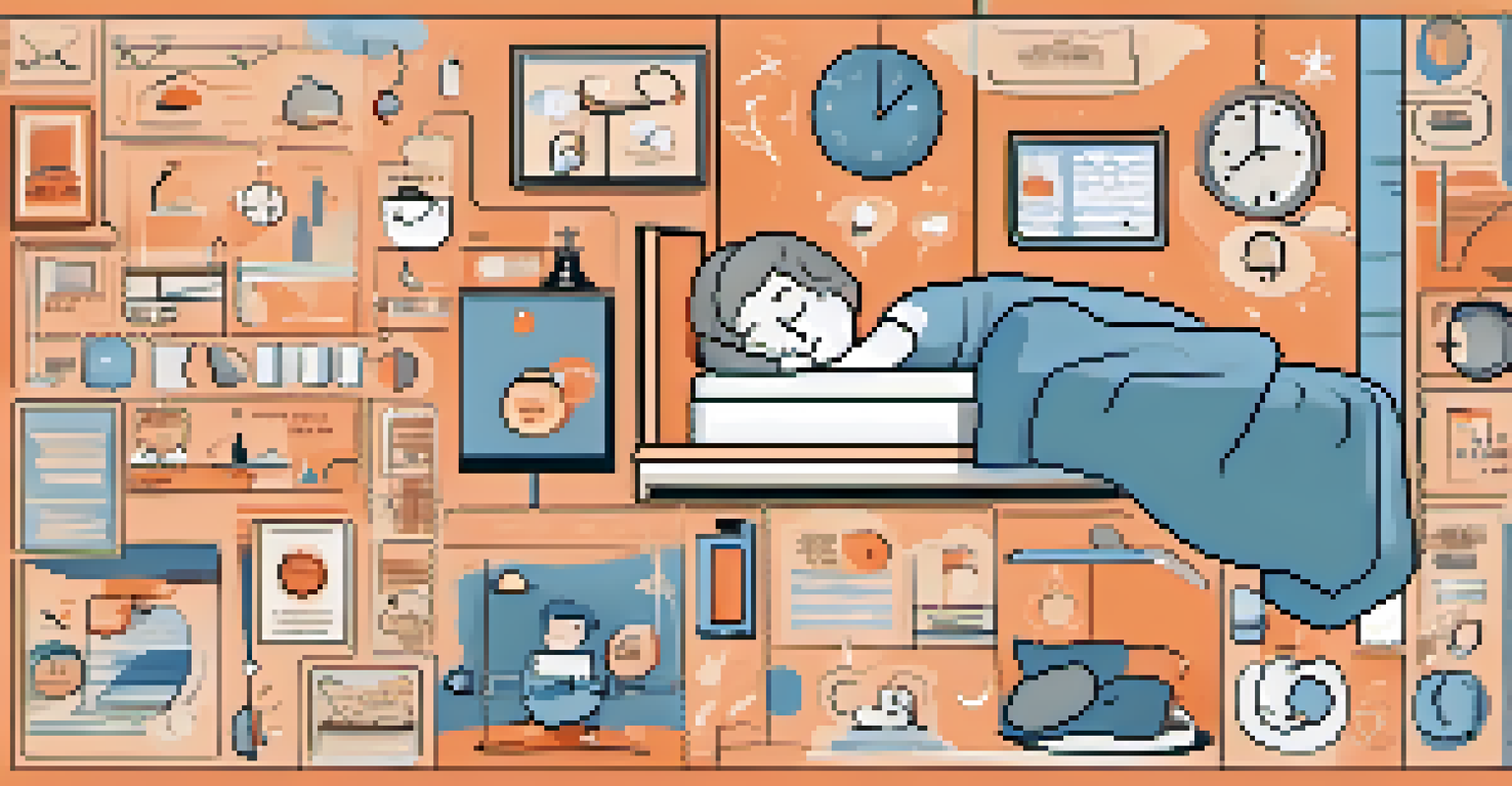Sleep Disorders: When to Seek Professional Help

What Are Sleep Disorders and Why Do They Matter?
Sleep disorders encompass a range of conditions that disrupt your sleep patterns. These can include insomnia, sleep apnea, restless leg syndrome, and narcolepsy, all of which can significantly impact your daily life. When you struggle to get quality sleep, it can lead to fatigue, irritability, and even serious health issues over time.
Sleep is the best meditation.
Understanding sleep disorders is crucial because they often go unnoticed or untreated, leading to further complications. For instance, untreated sleep apnea not only affects sleep but can also increase the risk of heart disease. Recognizing these disorders early on can pave the way for better health and well-being.
If you find yourself tossing and turning at night or waking up exhausted, it’s important to pay attention. Sleep is vital for our physical and mental health, so understanding the signs of a sleep disorder is the first step toward seeking help.
Common Signs of Sleep Disorders to Watch For
Many people experience occasional sleep issues, but persistent problems may signal a sleep disorder. Common signs include difficulty falling asleep, frequent awakenings, excessive daytime sleepiness, and loud snoring. These symptoms can disrupt not only your sleep but also your relationships and work performance.

For instance, if you find yourself dozing off during meetings or struggling to concentrate, it might be time to evaluate your sleep habits. Additionally, if your partner has noticed your snoring or gasping for air while sleeping, those could be indicators of sleep apnea, which requires attention.
Understanding Sleep Disorders
Recognizing sleep disorders like insomnia and sleep apnea is vital for preventing serious health issues.
Being aware of these symptoms can empower you to take action. Keeping a sleep diary to track your patterns can also provide valuable insights when discussing your sleep with a healthcare professional.
The Impact of Sleep Disorders on Daily Life
Sleep disorders can take a serious toll on your daily life, affecting everything from your mood to your productivity. Lack of sleep can lead to irritability and increased stress, making it harder to handle everyday challenges. It can also impair your judgment and reaction times, which is particularly dangerous if you're driving or operating machinery.
A good laugh and a long sleep are the best cures in the doctor's book.
Moreover, chronic sleep deprivation can contribute to long-term health issues such as obesity, diabetes, and cardiovascular diseases. The connection between sleep and overall health is well-documented, making it essential to address sleep problems early on.
In essence, sleep is as vital as nutrition and exercise. When sleep disorders go unchecked, they can lead to a downward spiral affecting every aspect of your life.
When to Seek Professional Help for Sleep Issues
Knowing when to seek professional help for sleep issues can be challenging. If you've tried self-help strategies like establishing a bedtime routine, reducing caffeine intake, or creating a sleep-friendly environment without improvement, it might be time to consult a healthcare provider. Persistent sleep problems that last for weeks or months warrant a closer look.
Professional help can provide you with tailored solutions based on your specific needs. A sleep specialist can conduct tests to diagnose conditions like sleep apnea or restless leg syndrome, ensuring you receive the appropriate treatment.
Signs to Watch For
Persistent symptoms such as excessive daytime sleepiness and loud snoring may indicate a sleep disorder that needs attention.
Don't hesitate to reach out if you're unsure. A simple conversation with your doctor can set you on the right path toward better sleep and overall health.
Common Treatments for Sleep Disorders
Treatment for sleep disorders varies based on the underlying cause and severity of the condition. Behavioral therapies, such as cognitive-behavioral therapy for insomnia (CBT-I), are effective in helping people change negative thought patterns related to sleep. These approaches can empower you to develop healthier sleep habits.
In some cases, medication might be prescribed, but it's essential to discuss the benefits and potential side effects with your doctor. For instance, while sleep aids can provide short-term relief, they may not be a long-term solution.
Lifestyle changes can also play a significant role in managing sleep disorders. Simple adjustments like maintaining a consistent sleep schedule, practicing relaxation techniques, and avoiding screens before bed can lead to better sleep quality.
Lifestyle Changes to Improve Sleep Quality
Making small lifestyle changes can have a big impact on your sleep quality. Start by establishing a consistent sleep schedule—going to bed and waking up at the same time each day can help regulate your body's internal clock. Additionally, creating a calming bedtime routine can signal to your brain that it's time to wind down.
Consider your sleep environment as well. A dark, quiet room that's cool and comfortable can enhance your sleep experience. Investing in a good mattress and pillows that support your body can also make a significant difference.
Lifestyle Changes Matter
Simple adjustments like a consistent sleep schedule and a calming bedtime routine can significantly improve sleep quality.
Lastly, pay attention to your daily habits. Regular physical activity, a balanced diet, and limiting caffeine and alcohol intake can all contribute to improved sleep. By prioritizing these changes, you can create a foundation for better rest.
The Importance of Ongoing Support and Monitoring
Once you seek help for a sleep disorder, ongoing support and monitoring are crucial for long-term success. Regular follow-ups with your healthcare provider can help track your progress and make necessary adjustments to your treatment plan. This collaborative approach ensures that you're not just managing symptoms but addressing the root causes of your sleep issues.
Support groups or therapy can also provide valuable emotional assistance. Connecting with others facing similar challenges can offer encouragement and insights into effective coping strategies. Sharing experiences can remind you that you're not alone in your journey towards better sleep.

Ultimately, prioritizing your sleep health should be an ongoing commitment. By staying proactive and seeking support, you can enhance your sleep quality and overall well-being.